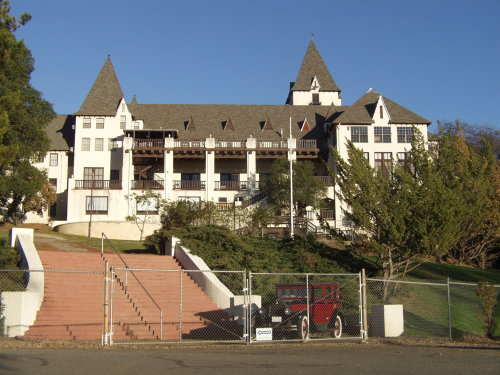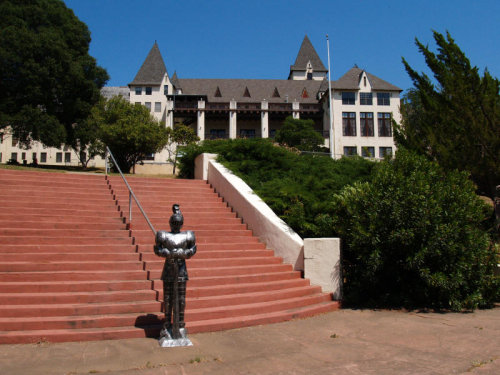- Elizabeth Larson
Board approves using grant funds for Lucerne Hotel study
Supervisor Rob Brown chaired Tuesday's board meeting, as Board Chair Denise Rushing and Vice Chair Anthony Farrington are in Washington, D.C. this week for President Barack Obama's inauguration.
Last week, the board held a discussion regarding the Lucerne Hotel, which has housed the Lucerne Christian Conference Center for many years, as Lake County News has reported.
The historic building, the construction of which began in 1926, has been used for Christian retreats and camps but is being put on the market by its owners – a group of Northern California fundamentalist Baptist churches – because bookings were dropping for the coming year.
During its Jan. 13 discussion, the board supported doing studies on the building to help market it to a sound buyer.
On Tuesday, Deputy Administrative Officer Matt Perry went to the board with the proposal to reallocate income from the Community Block Grant Building program in order to use it to look at the structural soundness of the building and to pay for an appraisal.
Perry said county staff has contacted some structural engineers to ask about pricing and have concluded that $30,000 is the ceiling amount to pay for that examination. The scope of work can be more clearly defined once the county puts out a request for proposals.
Regarding the pricing for appraisals, Perry said they've received quotes ranging from $7,500 to $15,000.
Brown said those numbers were reasonable. County Chief Administrative Officer Kelly Cox said the county has more money available if necessary, but they don't want to go higher than those amounts. Brown added that right now the county is getting very good deals on construction-related contracts.
Supervisor Jim Comstock asked if any projects wouldn't be funded should the money be moved over. Perry said no, that the only other project close to being designed is the Ninth Avenue sidewalk project in Lucerne. He added that the county always has the ability to use the funding for other projects, as long as it's attached to a written grant.
“Here's the catch-22 – the state wants us to spend down this month,” said Cox, noting that if they don't the state won't give the county more of the grant money in the future.
“I do think we need to do this because of how big and important this building is to this area,” said Brown. “We have to do something.”
Brown reiterated that the potential study amounts were reasonable, and the county could be reimbursed in the future by the buyer.
Cox said the state had originally provided the county with a grant to study the building last year. However, Cox reported at the last meeting that the building owners' representative said they weren't interested in selling the building so the study had been dropped. It was later discovered that the building's owners never heard about the possibility of the study until afterward.
Brown said the county was lucky to find someone – specifically, Lynne and Bernie Butcher – to take on the restoration of the Tallman Hotel and the rebuilding of the Blue Wing Saloon in Upper Lake.
Those were big projects, but they would be nothing compared to what it would take to restore the Lucerne Hotel property if it deteriorates, said Brown.
“We need to do everything we can to make sure that doesn't happen with this building – within reason,” he said.
Cox said county staff will do everything they can to help the old hotel's owners fund a new buyer.
“Now that we know the board's direction, we're really going to do everything we can to ensure the future of that building is up to its full potential,” Cox said.
Lucerne resident Donna Christopher was the only community member to speak during public comment. She thanked the board for the time and effort being spent on Lucerne, adding that she appreciates their effort to be fiscally conservative. Christopher also thanked county staff for quickly sharing information on community projects.
“It's great to see everybody realizing how good redevelopment can be,” said Supervisor Jeff Smith, calling redevelopment “a great tool.”
Smith offered resolutions to transfer the grant funding for the Lucerne Hotel study as well as curb, gutter and sidewalk projects in the Northshore Redevelopment Project Area, all of which passed 3-0.
In other redevelopment news, the board approved a bid presented by Deputy Redevelopment Director Eric Seely in the amount of $128,899.15 from Fedco Construction of Santa Rosa for a sidewalk improvement project from Fourth through Fifth Avenue in Lucerne, and a $20,000 bid from Ruzicka and Associates for construction inspection services on the project.
Nineteen bids were received for the sidewalk project, said Seely.
Cox said a Lake County company had come in at No. 3 in the bid process for the sidewalk project. The county's purchasing rules allow preference to be given to local contractors if they're up to 5 percent over the lowest bid, but even then the local company's offer wasn't quite close enough. Cox said county staff had looked closely for a way to be able to give the work to a local contractor.
The board approved both bids in 3-0 votes.
E-mail Elizabeth Larson at
{mos_sb_discuss:2}





 How to resolve AdBlock issue?
How to resolve AdBlock issue? 



